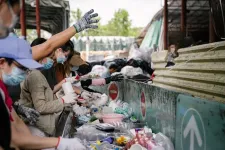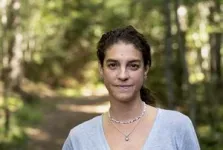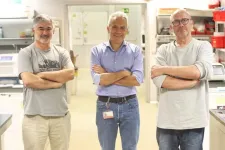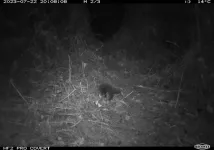(Press-News.org) When scientists examined pellets from recycled plastic collected in 13 countries they found hundreds of toxic chemicals, including pesticides and pharmaceuticals.
The results are published in a study led by scientists at the University of Gothenburg.
Because of this, the scientists judge recycled plastics unfit for most purposes and a hinder in the attempts to create a circular economy.
Delegates, scientists and health and environmental advocates from around the world are traveling to Nairobi, Kenya for next week’s meeting of the third session of the Plastics Treaty Intergovernmental Negotiating Committee (INC-3).
There scientists will urge delegates to heed the latest science showing that because toxic chemicals are used to make all plastics, and plastics will adsorb other chemicals during use, there are no plastics that can be deemed safe or circular.
“Plastic recycling has been touted as a solution to the plastics pollution crisis, but toxic chemicals in plastics complicate their reuse and disposal and hinder recycling,” says Professor Bethanie Carney Almroth, of the University of Gothenburg.
Over 600 chemical compounds identified
In a recently published study in Data in Brief via ScienceDirect, led by Carney Almroth, plastic pellets from plastic recycle plants in 13 different countries in Africa, South America, Asia and Eastern Europe were found to contain hundreds of chemicals, including numerous highly toxic pesticides.
In total, 491 organic compounds were detected and quantified in the pellets, with an additional 170 compounds tentatively annotated. These compounds span various classes, including pesticides, pharmaceuticals, industrial chemicals, plastic additives.
Present risk for all
There are few regulations on chemicals in plastics, and international trade in plastics waste complicate this issue.
In a correspondence published this month in the prestigious journal Science researchers from the University of Gothenburg, IPEN, Aarhus University, and the University of Exeter noted that: “The hazardous chemicals present risks to recycling workers and consumers, as well as to the wider society and environment. Before recycling can contribute to tackling the plastics pollution crisis, the plastics industry must limit hazardous chemicals.” More than 13 000 chemicals used in plastics with 25% classified as hazardous. Scientists state that “no plastic chemical [can be] classified as safe.”
“Need to phase out harmful chemicals”
Professor Bethanie Carney Almroth brings a clear message to next week’s meeting in Nairobi:
“Numerous studies show that hazardous chemicals can accumulate even in relatively close-loop plastic recycling systems. We need to rapidly phase-out plastic chemicals that can cause harm to human health and the environment.”
Scientific article in ScienceDirect: A dataset of organic pollutants identified and quantified in recycled polyethylene pellets
Correspondence in Science: Chemical simplification and tracking in plastics
END
Scientists found hundreds of toxic chemicals in recycled plastics
2023-11-10
ELSE PRESS RELEASES FROM THIS DATE:
New cooling ceramic can enhance energy efficiency for the construction sector and help combat global warming—City University of Hong Kong research
2023-11-10
A significant breakthrough in developing a passive radiative cooling (PRC) material has been announced by researchers at City University of Hong Kong (CityU). The findings have just been published in the prestigious scientific journal Science titled “Hierarchically structured passive radiative cooling ceramic with high solar reflectivity.”
The material, known as cooling ceramic, has achieved high-performance optical properties for energy-free and refrigerant-free cooling generation. Its cost-effectiveness, durability and versatility make it highly suitable for commercialisation in numerous applications, particularly in ...
CNIC scientists identify the crucial role of the protein neuregulin-1 in heart development
2023-11-10
In a study published in the journal Circulation Research, researchers at the Centro Nacional de Investigaciones Cardiovasculares (CNIC) led by Dr. José Luis de la Pompa reveal the essential role of the protein neuregulin-1 (Nrg1) in the intricate transformation of the heart from its delicate primordial structure into a powerful pumping organ.
The findings not only highlight the pathways through which the human heart forms, but also suggest important directions for future medical advances. Commenting on the study, Dr. de la Pompa, head of the ...
Bullying victims who perceive they’re targeted due to social characteristics feel the effects worse, new research suggests
2023-11-10
Students who feel they have been victimized because of social characteristics such as their ethnicity or their sexuality are at additional risk of trauma, a new national US study has revealed.
Published in the peer-reviewed Journal of School Violence, the research, of more than 2,200 young victims of bullying, found students reported that their physical health; self-esteem; social relationships, and schoolwork suffered more if they felt bias was behind the perpetrators’ actions.
This was particularly ...
Any activity is better for your heart than sitting – even sleeping
2023-11-10
The study, supported by the British Heart Foundation (BHF) and published in the European Heart Journal, is the first to assess how different movement patterns throughout the 24-hour day are linked to heart health. It is the first evidence to emerge from the international Prospective Physical Activity, Sitting and Sleep (ProPASS) consortium.
Cardiovascular disease, which refers to all diseases of the heart and circulation, is the number one cause of mortality globally. In 2021, it was responsible for one in three ...
Health: Lack of friend or family visits is associated with increased risk of dying
2023-11-10
Never being visited by friends or family is associated with an increased risk of dying, according to a study published in BMC Medicine. The authors suggest that their findings could be used to help identify patients at a higher risk of dying due to social factors, and to develop more effective interventions to combat the increased risk of death associated with social isolation.
Although previous research has identified associations between deaths due to any causes and both a ‘sense of loneliness’ and living alone, the combined impacts of different types of social interaction ...
Aid agencies are failing patients with breast cancer in war zones meaning more will develop advanced disease
2023-11-10
Lisbon, Portugal: Patients with breast cancer in conflict zones around the world are being “massively under-served” by governments, UN aid agencies and other non-governmental organisations (NGOs), Professor Richard Sullivan told the Advanced Breast Cancer Seventh International Consensus Conference (ABC 7). [1]
Among people fleeing conflict zones, either displaced within their own country or across borders to other countries, patients with breast cancer are the “single largest group of cancer patients that present to UN agencies and international NGOs,” said Prof. Sullivan, who is director of the Institute of Cancer Policy and co-director of the Centre for ...
Is the US reporting system for vaccine safety broken?
2023-11-10
Is the US reporting system for vaccine safety broken?
Investigation raises concerns that the system is not operating as intended and signals are being missed
A US reporting system designed to detect potential safety issues with vaccines is supposed to be user-friendly, responsive, and transparent. But an investigation published by The BMJ today finds it’s not meeting its own standards.
The Vaccine Adverse Event Reporting System (VAERS), co-managed by the US Centers for Disease Control and Prevention (CDC) and the Food and Drug Administration (FDA), collects reports of symptoms, ...
Gut bacteria protects against diarrhoeal disease
2023-11-10
Gut bacteria protects against diarrhoeal disease
Peer reviewed - Systematic review – people and animals
The severity of a diarrhoeal disease could be down to the bacteria in your gut – according to new research from the University of East Anglia.
Cryptosporidiosis is responsible for over 100,000 deaths annually – predominantly in children under five.
It also affects animals, and a new study published today shows that large animals – including primates - with less different ...
Found at last: Bizarre, egg-laying mammal finally rediscovered after 60 years
2023-11-10
A long-beaked echidna named after Sir David Attenborough and last seen by scientists in 1961 has been photographed for the first time in an Indonesian tropical forest.
An international team of researchers worked with local communities to deploy over 80 camera traps to film the elusive animal.
Besides rediscovering the echidna, the team uncovered a wealth of species completely new to science, including beetles, spiders, and a remarkable tree-dwelling shrimp.
A wide range of images and video footage from the expedition are available (see link below).
More than sixty years after it was last recorded, an expedition ...
WHO updates its guidance on treatments for COVID-19
2023-11-10
A panel of international experts representing the World Health Organization’s Guideline Development Group has updated its guidance on treatments for patients with covid-19.
The new recommendations published by The BMJ are part of a living guideline, developed by the World Health Organization with the methodological support of MAGIC Evidence Ecosystem Foundation, to provide up to date, trustworthy guidance on the management of covid-19 and help doctors make better decisions with their patients.
The guidance ...





